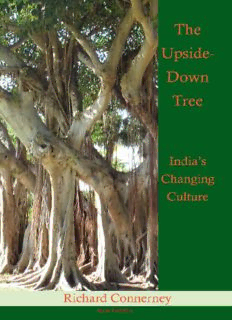
The Upside-Down Tree: India's Changing Culture PDF
Preview The Upside-Down Tree: India's Changing Culture
T U -d T he pside own ree T U -d T he pside own ree India’s Changing Culture Richard Connerney Algora Publishing New York © 2009 by Algora Publishing. All Rights Reserved www.algora.com No portion of this book (beyond what is permitted by Sections 107 or 108 of the United States Copyright Act of 1976) may be reproduced by any process, stored in a retrieval system, or transmitted in any form, or by any means, without the express written permission of the publisher. Library of Congress Cataloging-in-Publication Data — Connerney, Richard D. The upside down tree: India’s changing culture / Richard Connerney. p. cm. Includes bibliographical references and index. ISBN 978-0-87586-648-2 (soft cover: alk. paper) — ISBN 978-0-87586-649-9 (hard cover: alk. paper) — ISBN 978-0-87586-650-5 (ebook) 1. India—Description and travel. 2. Connerney, Richard D.—Travel—India. 3. India—Social life and customs. I. Title. DS414.2.C657 2009 954.05’32—dc22 2009007798 Front Cover: Banyan tree. Printed in the United States For Pat Oleszko, who made this book possible. AcknowledgemenT The Upside-Down Tree took many years to mature. The basis of the book was a series of newsletters I wrote for the Institute of Current World Affairs (ICWA) between January 2005 and January 2007. Upon my return to the United States, I slowly expanded, reorganized and reshaped this material, making great leaps forward during a fellowship at the MacDowell Colony in late 2007 and early 2008. Any value found in this book is due to the cooperation and influence of a long list of muses and teachers. All shortcomings and mistakes are my own doing. An incomplete list of those to whom I owe a debt of thanks follows Dr. Mukta Gupta’s summer visits were always eventful. Our long friendship is an ongoing disaster I am lucky to have experienced. My mother and father not only helped me out at various times during the fellowship, but, never having been to Asia before, visited me there and even enjoyed themselves. I owe Sibte Hassan both thanks and an apology. He brought me to a new level in my understanding of Indian classical music and showed warm hospitality at every opportunity. Unfortunately, I did not know how to treat guru-ji with the respect he deserved. That he bore all my missteps on this account without complaint proves his character and his good spirit. Biloo and his family were a godsend in Lucknow. His wife’s chicken kabobs were fantastic and his children were a joy. I will always remember the good times, and good food, at his house. Dr. Manuela Ciotti of the University of Edinburgh was an inspiration. She taught me a great deal about low-caste people in India, particularly the Chamars of Manupura. We had a few good laughs too. My free-spirited friends in Goa — particularly Amalia, Lila, Allan, Tatiana and Natasha — taught me that learning about India was only half the problem; the more difficult challenge was learning about myself. Elena Edwardovna of Moscow broke my heart, and in doing so reminded me that I still had one. For that, I owe her my gratitude. The Institute of Current World Affairs provided me with an opportunity to travel and work over an extended period in South Asia. Their generosity deserves mention. Peter Martin, former director of ICWA, edited some of my original reports from India. Brian Hackert and the staff of the Peterborough Public Library aided me in locating the necessary research materials — some of them obscure titles rarely seen in “Our Town.” The other fellows at the MacDowell Colony between November 2007 and February 2008 made the final push not only bearable but also enjoyable. I have never before or since experienced the conjunction of artistic talent and personal warmth in such measure. I have saved my biggest thanks to Sona, my kaam karnewalli and my friend. Were I to show this book to her, she could not read it, but she taught me more about dignity, determination and survival than any book ever could.
Description: